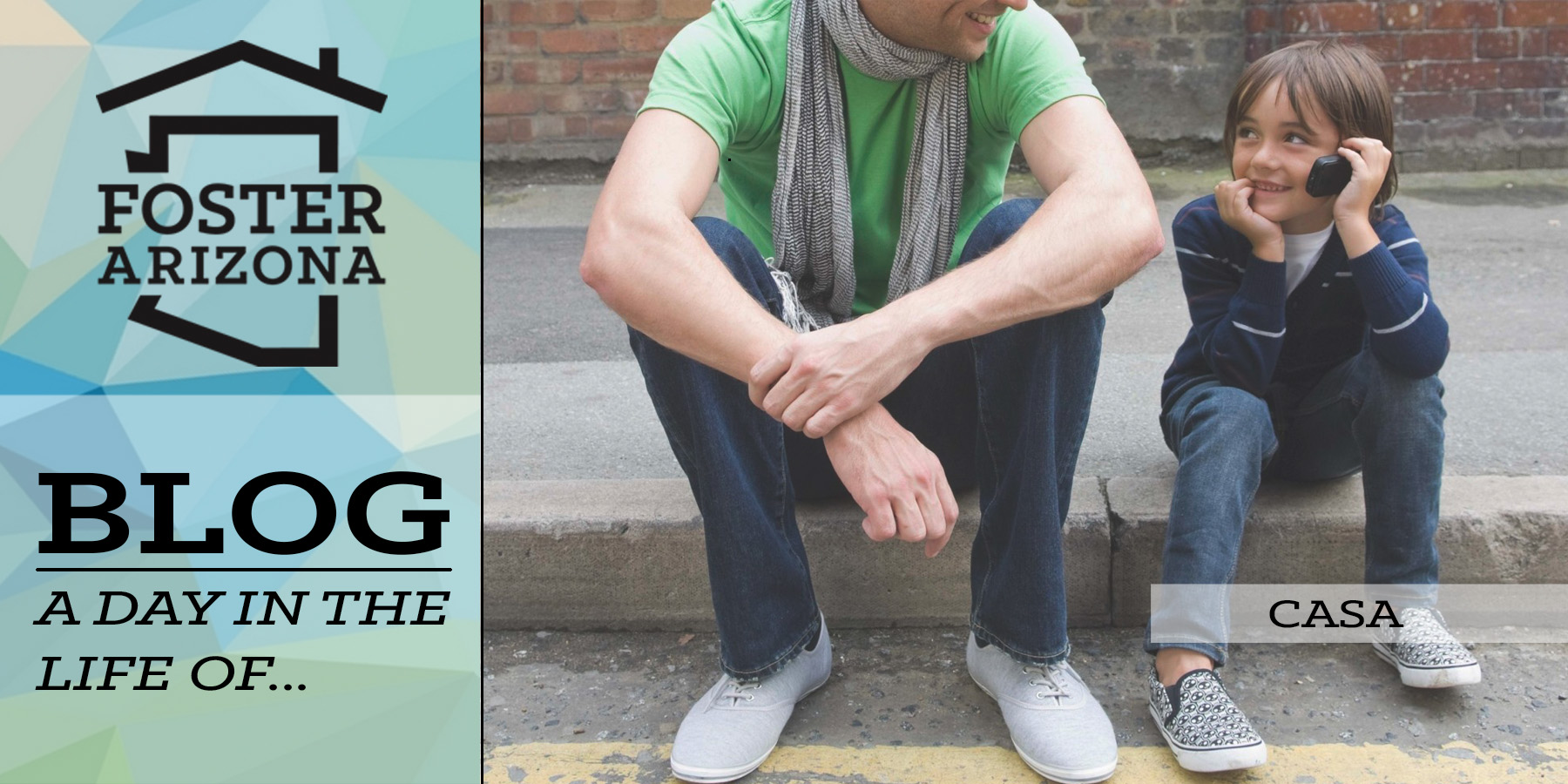Let me paint a picture for you…
You’re taking care of “Joey”, a child in foster care. You are a licensed foster parent (thank you, good-hearted person) or a “kinship” placement (thank you Grandma, Aunt, or other family member). You get a call from someone like me who says “Hi there, I’m the CASA assigned to Joey. Is now a good time to talk about his situation?” As a foster parent, you already know about the DCS case manager, the judge, and all the attorneys involved in the case, but what on earth is a CASA?
In formal terms, a CASA is a Court Appointed Special Advocate, a volunteer appointed by the court who advocates for a foster child. In Maricopa County alone, we’re 600 CASAs strong—and growing! Most of us, including me, handle just one case at a time, while everyone else connected to the legal case has a heavy caseload. We also commit to staying on for the length of the case – in other words, until our kiddo is returned home, is adopted, or has a legal guardian. Often, we’re the only constant in a child’s life when a case goes on long enough for the judge, the lawyers, DCS case manager and placement to change.
In layman’s terms, CASAs are volunteer “change agents” in the foster care system, helping youth find permanent, safe, and loving homes through learning what’s in the best interest for the baby, child, or teen. Literally, we help change lives!
A day in the life…
As CASAs, we spend time with our assigned kiddo throughout the month, talk by phone or in person to an individual filling a significant role in their life such as a teacher, therapist, doctor, relative, etc. We are information gatherers; when it comes time for their case to appear before the judge, we have a written summary of the child’s life, an accurate snapshot of what’s happening behind closed doors. Based on the written summary or report, a judge receives help deciding what is in the best interest of the child. What’s amazing is that a foster child assigned a CASA is far more likely to get out of the child welfare system and have a chance at life; a CASA can play a pivotal role in this process.
It’s not always a cake walk, but being a CASA is meaningful and uplifting—both for us and for our kiddo! As CASAs, we need to know “our” kiddos so that we understand their needs. Age appropriate fun is a way to connect with children (Translation: We get to have fun with them!). Right now, my kiddos are a brother and sister. Riding in my Mustang on the way to Dairy Queen led to some of the best conversations we’ve had (and, of course, I had to have ice cream, too, to be polite!).
Sometimes we get to do extra special things, thanks to Voices for CASA Children, a nonprofit dedicated to supporting CASA volunteers and their kiddos. I get a little giddy when I see those emails from VOICES announcing free tickets to Diamondbacks games, free admission to kid-friendly events, gift cards for back-to-school shopping, “Meet ‘n’ Greets” with Arizona Cardinals players, etc.
 The Arians Family Foundation, formed by Cardinals football Coach Bruce Arians and his wife, Chris (a former CASA), has also helped support our CASA community with incredible opportunities. When I met Coach and Chris recently, they both thanked me for being a CASA. Really – ME? I’m helping two kiddos, and they are helping thousands of foster children – and they don’t even get the ice cream. On behalf of all CASAs, I thank them for all they do.
The Arians Family Foundation, formed by Cardinals football Coach Bruce Arians and his wife, Chris (a former CASA), has also helped support our CASA community with incredible opportunities. When I met Coach and Chris recently, they both thanked me for being a CASA. Really – ME? I’m helping two kiddos, and they are helping thousands of foster children – and they don’t even get the ice cream. On behalf of all CASAs, I thank them for all they do.
What it boils down to…
Now, I have to be realistic: being a CASA is not all fun and games all the time. I read the DCS case file, the Court documents and therapist and school records. As mentioned, I get to know the immediate environment of my kiddos so I can inform the judge of what’s really happening. I try to establish relationships with the adults connected with my kiddos’ case – attorneys, DCS, therapists, placement, etc. – so that I can help build a team to work for my kiddos. In my cases, that teamwork has resulted in simple changes like getting DCS to quickly process the paperwork for an after-school program and in significant changes like getting the court to approve a change of placement in time for the start of school. CASAs appear in court and write Court Reports that judges and lawyers rely on to reach expeditious resolutions that are in the best interest of the children. A CASA’s polite but dogged persistence can make a child’s life better, and that is the greatest reward – way better than ice cream.
To learn more about becoming a voice for a child as a CASA volunteer, visit http://www.voicesforcasachildr
Karen Coatsworth
CASA Volunteer
